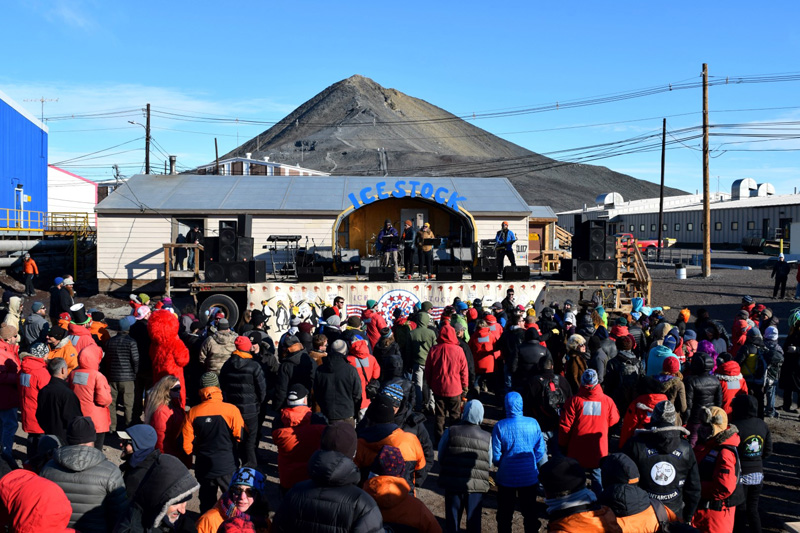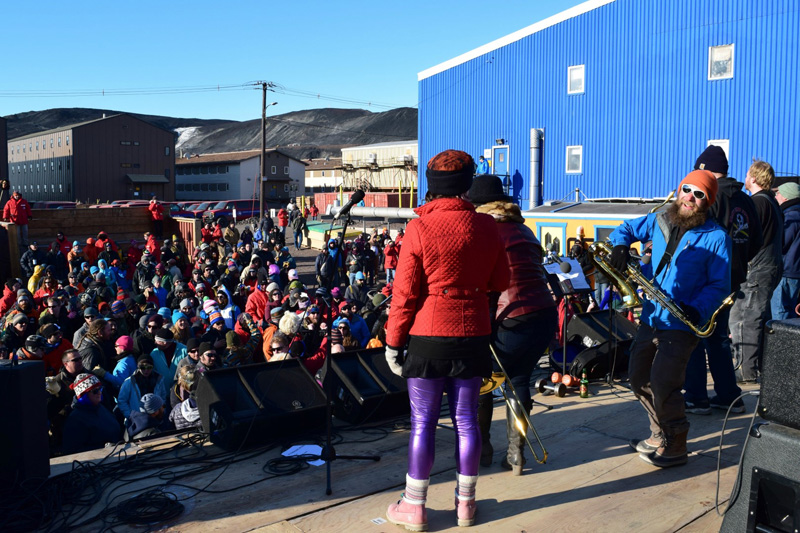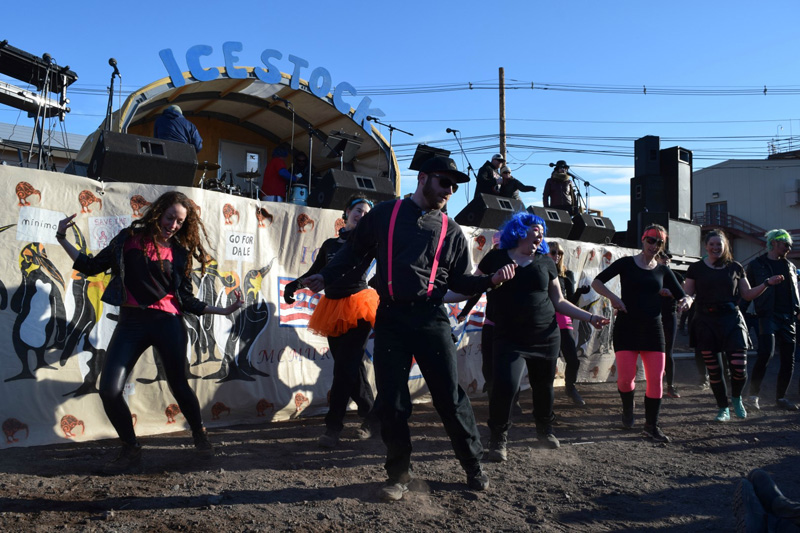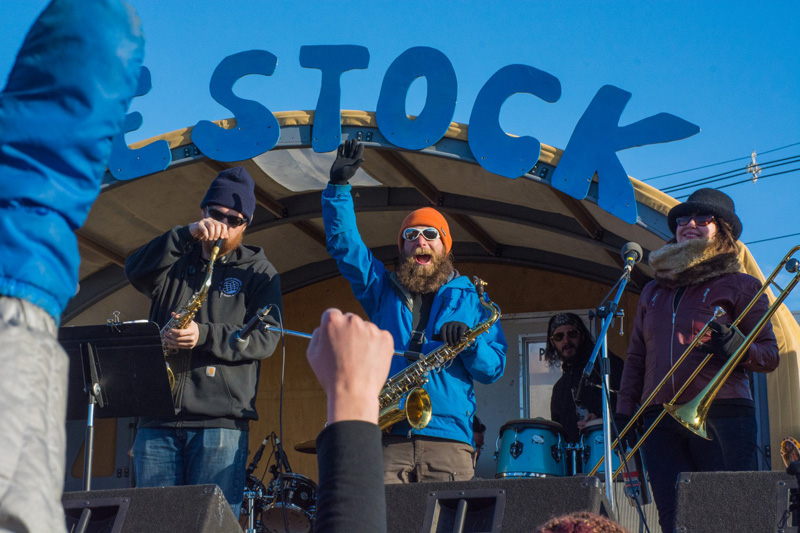
Photo Credit: Stephanie Krzywonos
|
The band "Alicia and the Bad Decisions" performs at this this year's Icestock.
|
Icestock Rings in the New Year
By Stephanie Krzywonos, Antarctic Sun Contributor
Posted February 2, 2016
Brisk winds blew through a bundled-up crowd, as they collectively bobbed their heads and swayed along to live music. Even though it was close to midnight, there was no need for stage lighting: the sun was still high overhead. The musicians played below large blue cutout letters that spelled out “ICESTOCK,” McMurdo Station’s annual New Year’s celebration and the world’s southernmost outdoor music festival.

Photo Credit: Stephanie Krzywonos
The crowd filled up the space outside Building 155 to hear a total of 14 bands.
“Considering the size of McMurdo’s population compared to other stations in Antarctica, it’s hard to imagine that Icestock isn’t the biggest musical event on the continent,” said Rick Campbell, one of the co-founders of the event.
Not only is Icestock the outdoor music fest closest to the South Pole, it’s perhaps one of the planet’s most exclusive. Though the event is free, only those who work on or around Antarctica’s Ross Island can attend.
Icestock is among a range of events, and certainly one of the most complex, arranged by members of the close-knit communities that work together to achieve the mission of the National Science Foundation-managed U.S. Antarctic Program. They harness the myriad talents—musical, culinary, organizational and otherwise-- in the station population to help keep morale high.
In 1989, Campbell came up with the idea for Icestock along with two friends—David Sullivan and Dane Terry.
“We were sitting at the Erebus Club, which is now Gallagher’s, and Dave mentioned a music gathering in Iowa called ‘Cornstock,’ somewhat modeled after Woodstock,” Campbell said. “[The first year] we had nine or eleven ‘acts’ with some folks playing in multiple gigs. It was a huge success.”

Photo Credit: Stephanie Krzywonos
At one point in between sets, a flash mob showed up and danced to the song "Everybody Dance Now."
Twenty-six years later, Icestock is still going strong.
At Icestock 2016, the exultant audience was surrounded by the stage and a few structures: a small warming hut, two bright orange dive shacks and a shipping container converted to stadium seating. Volunteers behind the counter in dive shack number five doled out burgers and brats supplied by the galley, while dive shack number nineteen was crowned by a green and white sign reading “Sawbucks.”
Inside the improvised concession stand, Liz Mockbee, one of McMurdo’s carpenters, handed out steaming cups of coffee and hot chocolate.
“The dive shacks are vacant during the middle of summer, but we can use them for this event,” she said. “With Fleet Ops’ help, we set up the stage, which is made up of two old flatbed trailers that aren’t useful for much else.”
Just as Icestock’s stage and humble festival village are assembled every year from what’s available, so too are the bands.
Outside, the four members of Alicia and the Bad Decisions, one of the evening’s fourteen acts, played a jazzy acoustic rendition of a Beyoncé song. On stage Collin Stackhouse, a materials person, lent his voice and twenty years’ worth of fiddling skills to this band as well as three others.
“[Almost] everyone in this band is in four or five other bands,” he said. “The bands are formed and re-formed here every season.”
Very few of the bands that play at McMurdo have played anywhere else. While he listened to the performers in the next band shred on electric guitars, Stackhouse remarked that though the musicians range from amateur to professional, “the number of talented musicians per capita at McMurdo is incredible.”
Scott Gilbert, this year’s lead organizer and a musician in three bands, agreed. “The talent pool at McMurdo this year is very deep. I’m always amazed by the variety of talent and the number of bands that come together from the McMurdo community in a just a few months.”
Like many events at McMurdo, Icestock is run by volunteers. Everything from building the stage to passing out drinks at the concession stand is done by station residents volunteering their time on their day off.

Photo Credit: Michael Lucibella
The crowd cheers for the band "Dr. Funkenstein."
There are no tryouts for Icestock; any willing band or musical act is welcome to perform. Earlier in the evening, Dave Beyerlein performed as founder of the eponymous but ironically named Dave Beyerlein’s One Man Band. In fact the “one man band” is a choir of more than a dozen people. The enthusiastic, ragtag troop sang and danced along to a recording made by Beyerlein’s friends back home.
“It was my first musical performance, and my last,” he said with a chuckle. “Performing at Icestock was on my bucket list of things to do here.”
Beyerlein, a former entrepreneur, was convinced by his daughter, an airfield supervisor at McMurdo and a thirteen-season veteran, to come out of retirement and work at the station. “I wouldn’t have come if she wasn’t here,” Beyerlein said with a smile.
A hand-painted banner, inspired by the election year, hung across the foot of the stage. “Every year the banner is different,” said Jess Ackerman, who works for air-traffic control. “Whoever is ambitious enough to take on the banner gets the job.”
In the center of the banner is the face of Dale Rivers, the foreman of Fleet Ops, sporting an Uncle Sam hat and flanked by picketing emperor penguins. On stage, the band Gopher Dale was introduced by Rivers himself. He playfully pretended to answer a radio call, which he does many times per day with what has become a catchphrase around McMurdo, “Go for Dale!”
When asked about the banner, Dale said that, “It was a surprise for me to see my face painted on the banner. The phrase ‘Gopher Dale’ has taken on a life of its own. And the funny thing is… at home I hunt gophers.”
As Gopher Dale finished its last tune, the 80’s dance hit “Everybody Dance Now” blared over the loudspeaker and a flash mob ran in front of the stage, stealing the show. Light from the midnight sun reflected off of their metallic spandex as the group grooved in sync with each other, kicking up volcanic dust as they danced. The crowd went wild.
“This is the perfect time in the summer season for this event,” said Jeremy Nylander, a seasoned carpenter. “It’s New Year’s and people want to be home. This is the boost that we need to get through the rest of the season.”
Ron Farris, serving in his first season as the support contractor’s station manager, agreed.
“It was a blast! I thoroughly enjoyed it,” Farris said. “I didn’t really know what to expect but was very impressed with the ambiance created by the eclectic group of people that comprise the McMurdo ‘family,’ the quality of the music and food and the audacity of fashion statements!”
He added that he was impressed with how the community came together to plan, execute and clean up after the festival, and all of the other activities at the station. “We’ve had a tremendously successful season because people care deeply about both the mission and each other.”
Towards the end of the evening, it became time to officially usher in the New Year, even though the celebration took place on Jan. 2 to better coincide with the weekend. In between songs, vocalist Toby Summerhayes announced, “Okay, we’re going to do the countdown now, even though it isn’t midnight, but then again it isn’t even New Year’s Eve either.”
The festival-goers happily indulged her. And then the music played on.








